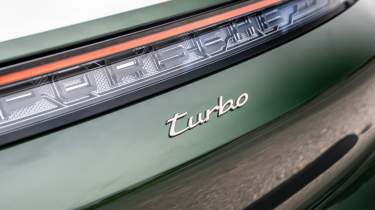Porsche Taycan – engine, gearbox and technical highlights
All but the base model feature a motor on each axle, the rear mated to a two-speed ’box
All Taycans save for the entry-level model have an electric motor on each axle, with a two-speed gearbox on the rear motor and flat battery pack running the length of the cabin. There are two battery pack sizes, 82kWh and 97kWh, but the packaging is the same for both options. Compared to the original Taycan, the Gen 2’s units are more energy dense, so despite having a larger capacity they’re actually lighter.
The facelifted mode is also more powerful across the board. The Taycan’s peak power output comes under launch control and overboost, which in the base rear-drive version results in 402bhp. This rises to 429bhp if you specify the larger battery option.
The 4S, meanwhile, generates 456bhp from a pair of motors, or 510bhp with the bigger battery. The Turbo is where things get very serious – the 97kWh battery comes as standard, and powers two motors for a combined 872bhp. This increases to 939bhp in the Turbo S, and a Lamborghini Revuelto-beating 1020bhp in the Turbo GT.
The Taycan was the first production vehicle to have an 800-volt electrical system, where some others make do with a 400-volt set-up. It’s this higher 800-volt rating that allows it to deliver consistent performance both against the clock and when at a charging station, where a 10-80 per cent top up takes 18 minutes thanks to 320kW rapid charging capability.
More reviews
In-depth reviews
Review
Reviews
The Taycan’s J1 platform packs a raft of sophisticated chassis technology. It supports air suspension (fitted as standard), a torque vectoring rear differential and, new for the Gen 2, optional active suspension – called Active Ride, in Porsche speak. The system uses electrohydraulic pumps to control the support from each damper, with the ability to counteract acceleration, braking and cornering forces to keep the body level. The standard suspension consists of two-chamber air springs with two-valve adaptive dampers (steel springs are no longer an option). Carbon ceramic brakes are available, too, with mammoth 420mm and 410mm discs gripped by ten piston calipers.
The Turbo GT can be ordered with a Weissach Package at no extra cost, which deletes the rear seats and adds carbon buckets up front, as well as carbon B-pillar, door mirror and side skirt trims. This saves a total of 75kg compared to the non-Weissach car, but at 2220kg the Turbo GT is still a heavyweight. It also gets a larger fixed spoiler to boost total downforce to 220kg, as well as Active Ride suspension with a Weissach-specific tune.
At the other end of the spectrum is the Cross Turismo, which sits 20mm higher than standard and comes with a Gravel drive mode to improve traction on loose surfaces. It's only available with four-wheel drive and in 4, 4S, Turbo or Turbo S spec, and weighs around 30kg more than the equivalent saloon. The normal Sport Turismo estate is more road-biased and loses the plastic body cladding and raised ride height.




